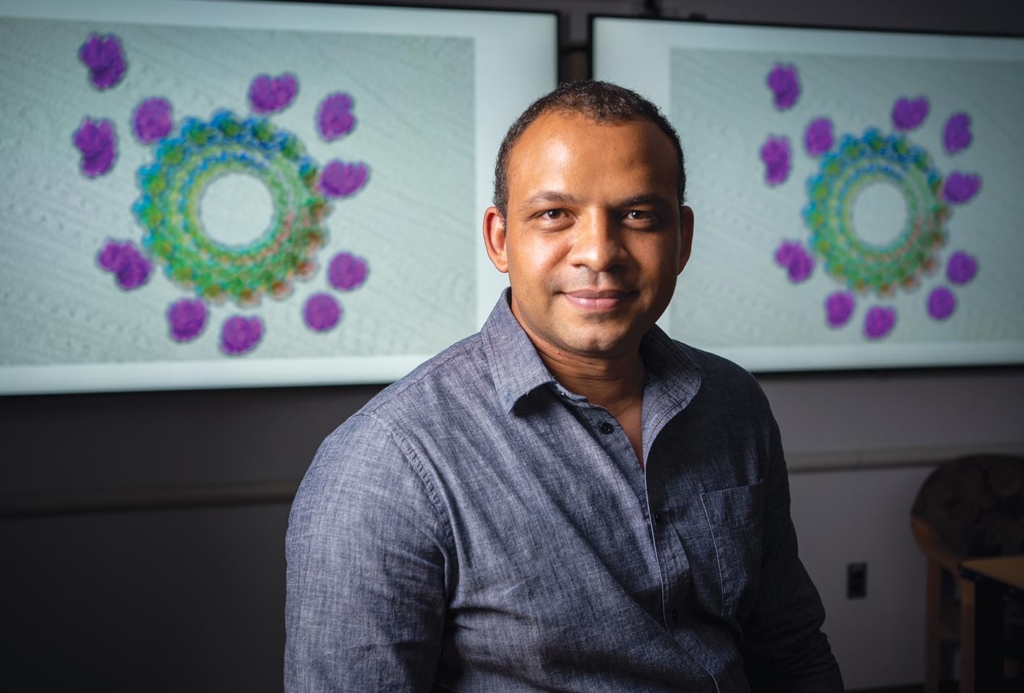
Library reading inspired John Jimah ’08 to fight malaria.
When the border town of Bawku, Ghana, built its first library, young John Jimah ’08 became a regular visitor. Paging through donated encyclopedias, he lingered over entries about diseases. Malaria was especially familiar — he’d had it several times. When he was 10, he became ill enough to be hospitalized. Inside that one-room library, Jimah set some goals: One, become a scientist. Two, improve human health.
He’s on track with those goals today. In January, Jimah joined Princeton University as a new faculty member. His lab will study proteins from parasites that cause malaria and other diseases. The world desperately needs effective malaria vaccines, and parasites are getting better at resisting drugs. Understanding parasite proteins could lead to solutions for both of those problems.
The malaria parasite fascinates scientists because it has a complicated life cycle with many stages. The same could be said of Jimah’s life. As a scholarship student at one of Ghana’s elite high schools, he feared his future coursework in Ghana would be too science focused. “I was still interested in learning about the world … and Colgate offered that opportunity” by giving him a full scholarship, he says.
He’d never been to the United States before, and he’d never turned in schoolwork on a computer. Nevertheless, he thrived. True to his wish to understand the world, Jimah studied abroad in Denmark and completed a research project about gender and economic policy. On Colgate’s campus, he gravitated toward the Cooley Science Library, where the number of books overwhelmed him. “I didn’t know where to begin, but I knew I wanted to learn,” he says. A book on the library’s display shelf captivated him. Titled Nature’s Robots, the book was about proteins, and it sparked a burning curiosity that would propel Jimah to his next stage.
Once again, Jimah didn’t take the expected path. Instead of going straight to graduate school after Colgate, he worked as a lab technician for three years to gain real-world experience and financial independence. He then attended Washington University in St. Louis, where he earned his PhD by combining his fascination with proteins and his interest in diseases. Scientists knew that a parasite protein called CelTOS was important for two stages of malaria’s life cycle, but they didn’t know why. Jimah learned that CelTOS busts open cells’ protective membranes from the inside. The parasite needs to travel between humans and mosquitoes to reproduce, but it can’t do that if it’s trapped inside a human or mosquito cell. Today, CelTOS is one of many proteins that scientists are evaluating as the possible basis for a malaria vaccine.
The CelTOS project spurred Jimah to study other proteins that alter cell membranes, both in disease-causing agents and healthy cells. He became a postdoctoral fellow at the National Institutes of Health (NIH), where he learned state-of-the-art techniques to determine what an important family of membrane-altering proteins looks like and how its members function. It’s these types of proteins that Jimah will study at Princeton.
He already has funding to support his lab. Jimah is one of the first cohorts of MOSAIC scholars, a competitive NIH program that helps scientists from diverse backgrounds to get labs up and running. This program doesn’t just give money; it offers peer support from fellow MOSAIC scholars and mentoring from a scientific society. That’s important for scientists like Jimah, who come from underrepresented groups. “I’ve had so many great mentors,” he says.
Jimah is now at the stage where he wants to give back. During the pandemic, he cofounded a virtual seminar series that brings eminent scientists from diverse backgrounds to network with NIH fellows. He’s hoping to make a contribution that will improve the Bawku library he remembers so fondly. As he begins the next stage of his dynamic life, he’s set a new goal: “I hope I’ll be in a position to be a good mentor
to others.”
